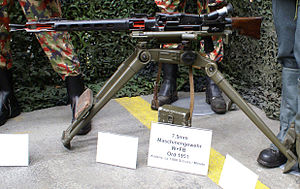MG 51
| Maschinengewehr 51 | |
|---|---|

W+F MG 51
|
|
| Type | General-purpose machine gun |
| Place of origin | Switzerland |
| Service history | |
| In service | 1951–present |
| Used by | Swiss Army |
| Production history | |
| Manufacturer | Waffenfabrik Bern |
| Produced | 1951-present |
| Specifications | |
| Weight | 16 kg (35.27 lb) (with bipod) 26 kg (57.32 lb) (with tripod) |
| Length | 1,270 mm (50.0 in) |
| Barrel length | 563 mm (22.2 in) |
|
|
|
| Cartridge | 7.5×55mm Swiss, 7.62×51mm NATO |
| Caliber | 7.5 mm |
| Action | short recoil-operated |
| Rate of fire | 1000 rounds per minute |
| Muzzle velocity | 750 m/s (2,460 ft/s) |
| Effective firing range | 100 - 2000 m sight adjustments |
| Feed system | 50-round magazine belt |
| Sights |
Iron sights 2.3x optical sight |
The 7.5 mm Maschinengewehr 1951 or Mg 51 is a general-purpose machine gun manufactured by W+F of Switzerland. The weapon was introduced into Swiss service when the Swiss Army initiated a competition for a new service machine gun to replace the MG 11 heavy machine gun and the Furrer M25 light machine gun adopted in 1911 and 1925 respectively.
The MG 51 is based on the World War II German MG 42 but made from heavier machined components and hence slightly heavier.
In around 1942 the Swiss army initiated a competition for a new service machine gun to replace both the “heavy” MG 11 and the “light” Lmg25, adopted in 1911 and 1925 respectively. Three participants joined the competition–government-owned Waffenfabrik Bern, and privately owned factories SIG and Hispano-Suiza. Waffenfabrik Bern based its development on the hugely successful German MG 42. The first prototypes emerged in around 1944, and looked much like MG42, although the shape of receiver and butt was somewhat different. The final design, which appeared in 1950, was in most respects similar to the MG 42, although many parts were produced by machining instead of stamping, and the locking system was changed from roller to flap locking. The resulting weapon was heavier than the German original, and much more finely made and finished. In certain respects it was a “Rolex” of machine guns. Until very recently MG 51 served as a primary infantry and vehicle machine gun for Swiss army, although it is now being gradually replaced in service with lighter and less expensive, but also less powerful 5.56mm FN Minimi machine gun of Belgian origin and manufacture. The MG 51 is a short-recoil-operated, locked breech, air-cooled and automatic only, belt-fed weapon. It uses a modified MG 42 type locking system with a two-piece bolt and dual locking flaps located in the front part of the bolt. These flaps engage the cuts made in the short barrel extension to provide rigid locking. Upon recoil, the flaps are retracted toward the center of the bolt, to unlock it. An additional lever-type bolt accelerator is provided; it is located in receiver, next to the barrel breech and below the bolt. The gun housing also somewhat resembles the German MG 42, although it is made from two separate parts – the barrel jacket (made from stamped steel) and receiver (a solid machined body). The barrel jacket is permanently welded to the front of the receiver. The barrel can be changed rapidly if required; the barrel change procedure is similar to that of the MG 42, with the locking latch located at the right side of the jacket, which is opened to provide a barrel replacement window.
...
Wikipedia
